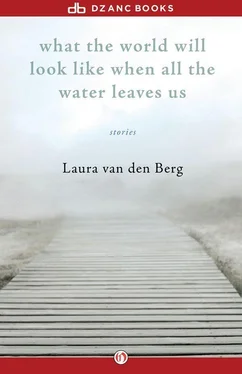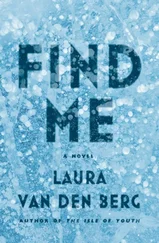“Celia,” she said. “Why have you been avoiding the forest?”
“I didn’t know I had been.”
“You’re always thinking about water,” she said. “We’ve been here for six weeks and you’ve never once asked to come into the field with me. Don’t you care about what’s happening to the lemurs? Don’t you want to see them?”
“I hear enough of them.” Closer to the rainforest, the Indris were louder than ever, cawing in a way that made me want to scratch my ears. “I really don’t think I’d mind if they went extinct.”
“Which would leave me with nothing,” my mother said, getting out of the car. I sat in the passenger seat for a moment longer, waiting for the ache to fade, before joining her.
We carried backpacks; binoculars hung from my mother’s neck. As we moved deeper into the forest, the light darkened. She was already a few feet ahead and I had to hurry to catch up. We walked an overgrown path, thick with tree roots, and while the Indris must have been unbearably loud by then, the noise was not what I remembered. I remembered walking behind my mother, the sweat seeping through the back of her T-shirt, the sway of her blonde ponytail. Her telling me about lemurs having symbiotic relationships with tiny birds and the five layers of the rainforest: the overstory, the canopy, the understory, the shrub layer, and the forest floor. She said each part had its own little ecosystem, its own little universe. And weren’t people like that too, she continued, worlds unto their own. I began to wonder if I had been avoiding the rainforest after all, wanting so badly to carve out a purpose that I’d had to find my own landscape. Or maybe I had been frightened of what existed here, scared that whatever had intoxicated my mother would reach me too, that my own desires would disappear into the mist and heat and ceiling of green.
My mother stopped to peer at two ringtails through her binoculars. She told me it was unusual to see a pair, since they typically traveled in groups. I was glad we didn’t spot any of the lemurs she and Daud had trapped and tagged. It pained me to imagine these ringtails being captured and sedated, my mother clipping little plastic bracelets around their spindly ankles and staring at them through the bars of a cage.
When my mother’s right leg began cramping, we rested underneath a tree. I asked if she’d gotten leg cramps before and she nodded, adding that Daud got annoyed if she slowed them down. “Which is why you can’t slow down,” she said. “If you do, no one will wait for you.”
“You’ve been working in jungles too long,” I said. “People don’t think like that everywhere.”
“That’s what you say now.”
“Maybe we should go back to New York for a few months,” I said. “I’d like to give school another try.”
“You don’t need high school,” my mother said. “Algebra, sentence diagramming, spelling quizzes. None of that matters.”
“You have a doctorate,” I said. “You couldn’t be here if it weren’t for your education.”
“Nothing I learned in the classroom is helping me.”
“I miss our house.” I picked up a handful of dirt, then let the black earth fall through my fingers.
“There’s nothing for us in New York,” my mother said.
“But what will you do?” I looked away when I realized I’d said you and not we.
“We should head back to South America,” she said. Her sunglasses were crooked on her face. “More primate habitats are going to be deforested. A group of scientists are planning to protest outside logging companies, to stand in front of machines. We could be part of a resistance.”
But what was there for me in South America? I wanted to ask. My mother must have seen something in my expression because she pointed out a Crested Ibis swooping between the trees. She always drew my attention to birds when she wanted to change the subject.
In thirty minutes, she was paler and sweatier and the cramp in her leg still hadn’t passed.
“I think we should go back,” I told her.
“I promised to get images of the Black-and-White lemurs today,” she said. “They’re at least a mile deeper into the forest.”
So we got up and we walked. My mother didn’t tell me the names of plants or tree frogs or anything else we passed. I knew she was unwell. She photographed the Black-and-Whites, who had a peculiar way of balancing atop bushes, and then we returned to the Jeep and drove to the hotel. Daud was still not back. In her room, she lay down on the bed without undressing. I took off my shoes and lay next to her. Open water swimming had changed my body; the muscles in my legs were harder, the skin on my stomach darker and tighter. I looked at my mother’s arms. Her wrists seemed fragile, the points of her elbows too angular.
“Maybe I should call the hotel owner,” I said, my voice nearly a whisper. “If you’re not feeling well.”
She shook her head, her sunglasses slipping down a little. “So you really want to be a swimmer?”
“I think so.”
“When did this start?”
“While we’ve been traveling,” I said, though I knew it had really begun long before.
“You have too much fear right now,” she told me. “The man who took you canoeing said you wanted to turn back after passing the first crocodile.” She rested her hands on her stomach. “When you commit yourself to swimming across a river or an ocean channel, you’re committing yourself to the possibility of death. Your team, the people you train with, won’t care if you drown or die of exhaustion. They’ll only care if you break the record. And so that’s all you can care about too.”
“I’ve been practicing,” I said.
“Do you swim until your legs are so tired that you can’t kick anymore? Until you begin to sink?”
“No.”
“See?” she said. “Still too much fear.”
“That doesn’t sound reasonable.”
“Reason is overrated,” she said. “Caution and beauty too.”
We were quiet for a while, lying close enough for me to feel the heat of her skin, to smell the dirt and sweat. For a brief time, it was as calm as floating in a waveless body of water, someplace still and boundless.
“Celia,” she finally said, her voice low and hoarse. “Do you think of me as June ?”
“I’ve been calling you that, haven’t I?”
“But in your mind. Am I June to you there?”
“Thinking of you as my mother is a pretty hard habit to break.”
She sighed. And then she fell asleep. I stayed with her a little longer, staring at the cracks in the ceiling, spidery lines that reminded me of split earth. The room was hot. I was hearing the lemurs again, a blanket of noise like falling rain.

Daud returned late in the night and by the time I heard him climbing the stairs, my mother had been vomiting for hours. It had started soon after I returned to my room, when I heard retching through the walls and found her hunched over her small, rusted bathroom sink. Her sunglasses had fallen off and when she looked at me, I saw dark pockets underneath her eyes.
“Cholera,” Daud said from the doorway. “She’s been showing signs for a few days. Leg cramping, drowsiness. She’s been filling her canteen with river water. I told her that wasn’t a good idea, but she wouldn’t listen.”
“Why would you do that?” I shouted into the bathroom.
“I’ve been traveling for years and I’ve never been sick once.” My mother was still leaning over the sink. “I’m supposed to be immune.”
Daud said he needed to get an ORS packet, an electrolyte powder that would be mixed with boiling water. The cholera would pass in a few days, but in the meantime, dehydration was a danger.
Читать дальше













